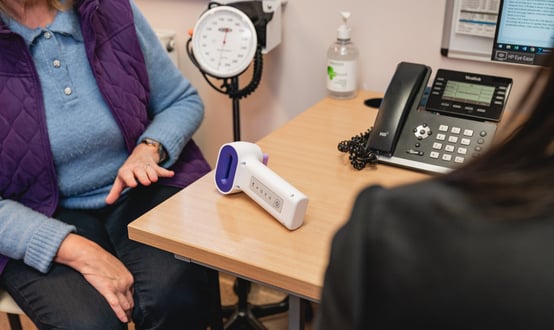Oxford blues?
- 29 March 2012

Despite the myriad challenges of implementing an electronic patient record system, successful trusts come out on the other side with “no regrets.”
So says Dr Paul Altmann, the chief clinical information officer of Oxford University Hospitals NHS Trust, which went live with Cerner Millennium in early December.
He says the trust has a “very clear vision” to be free of paper within a “relatively small number of years.” But he also argued that unless a trust is moving into a new build hospital, it will take it between three and five years to go paperless.
“People need to understand that,” he adds. “Once you are mainly working in a digital environment the benefits are huge, but people don’t always understand that you can’t achieve that overnight.
“I have spoken to lots of successful deployments around the world and they all say this is one of the hardest things you will ever do, but then you come out the other end, no regrets.”
Problems predicted
Oxford University Hospitals NHS Trust is huge, with more than 3,500 staff working from four major hospitals.
One of its sites – the Nuffield Orthopaedic Centre – was the first to implement Cerner Millennium, when it was an standalone trust and Fujitsu was still the local service provider for the South of England.
BT, which now holds the contracts to support the ‘live’ sites in the South, moved the Nuffield to the latest version of Millennium before Oxford’s other two main hospitals started using it as their patient administration system.
Millennium is also in use in the maternity and A&E departments. The Oxford Mail reported a lot of local unhappiness with the go-live, saying the trust had to suspend its parking charges and that clinics over-ran by hours.
The trust, however, has always insisted that it planned to suspend the charges, and that the level of disruption was no worse than it had anticipated, although there were some problems with staff taking longer to book appointments through the Patient Contact Centre.
Dr Altmann says many of the issues that have arisen so far relate to staff not remembering their training. “We have had the expected amount of issues related to that sort of thing.
“I wouldn’t say that we are quite where we want to be either in [the emergency department] or maternity, simply because it takes several months before people are over the initial go-live.”
Extra support was needed in the emergency department, including more floor walkers to help staff who became “flustered” when a patient was in front of them and they forget the correct processes to follow.
“It’s important that you have really adequate floor walking capacity,” Dr Altmann says. “Because of the state of the economy, it’s not always possible to have as many people as you would like.”
The trust has also made some minor changes to the way the system is configured to improve workflow “but these things take time to bed in,” he adds.
“[Last] week we’ve made a further tranche of tweaks to the configuration, having had time to take a hard look at the configuration across the systems.”
Reporting in place
Some news organisations have reported that things are still not well at Oxford, based on a report to the board in January that said the trust was facing ongoing data quality issues and that it had still to report performance data from Millennium.
Dr Altmann says the trust had not been planning to use Millennium for reporting in the immediate aftermath of the go-live. “We are reporting now. There are a number of minor issues, but essentially we are working pretty much as normal,” he adds.
“The whole of the old patient administration system has been replaced. It usually takes about 18 months for all the data quality issues to settle down; that’s to be expected. There’s nothing particularly surprising about the sorts of issues that have arisen, they are all predictable.
“When you put in a system that has a lot of clinical functionality, you need to change the way the organisation thinks in terms of the whole process around admission, discharge and transfer. That really does have to be done in real time, and that’s the thing that it takes a while for people to get their heads around.”
Clinical moves planned
A more recent board paper, dating from the March meeting, says detailed planning is now taking place for the next phase of the roll-out of the system, which will mean more clinical functionality becoming available to staff.
Dr Altmann says the trust has already seen some benefits from the new system. For example, he now has real time access to what is bringing people into the emergency department, “which is a fantastic advance.”
“But we’ll need a while before the dust settles and we really start to drive the benefits out; it’s still very much in early days,” he stresses again.
Another tangible benefit he cites is specimen labeling, which is now done at the bedside in the Nuffield hospital and in the maternity department, where phlebotomists electronically label specimens using the system “there and then.”
However, Dr Altmann is keen to push forward and roll-out more functionality, to make sure clinicians can see the importance and benefits of having real time information inputted into an electronic record.
“One of the things that can happen if you don’t move fairly rapidly to a clinical roll-out is that the whole reason for having that real-time bed state isn’t driven by the clinical requirement,” he says. “It remains driven by a management requirement; which is never quite as tangible.”
Overall, he repeats, a project of this scale is hard. “You really do need to lead as a trust. You need to have a fully engaged executive and you need to have all your medical divisions properly engaged.
“That’s always a struggle because people have all sorts of other agendas they have to answer to and you need a lot of support.
“But actually, we feel that it’s gone pretty well so far. That doesn’t mean we’re complacent – there’s still plenty of challenges – but we knew it was going to be a pretty hard year.”




